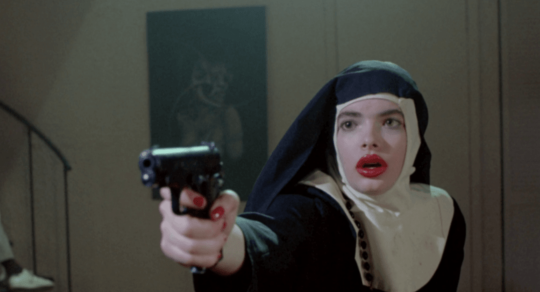The Exterminating Angel: On the Wrongness and Righteousness of Abel Ferrara’s “Ms. 45″ by Scott Tobias
By Yasmina Tawil
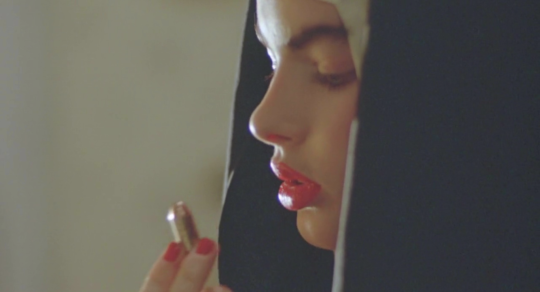
The most famous shot in Woody Allen’s Manhattan was photographed in the early light near the Queensboro Bridge, with Allen and Diane Keaton sitting on a bench in Sutton Place Park at East 58th Street. The bench occupies the far-right corner of Gordon Willis’ widescreen, black-and-white frame, with the bridge itself, illuminated by two sets of necklace lights, stretching from end to end. Folding this romantic moment into an unabashed love letter to the city itself, the shot was such a perfect distillation of the film’s spirit that it was used for the poster.
Two years later, on the same bench with the same view of the Queensboro Bridge, Thana, the mute heroine of Abel Ferrara’s rape/revenge exploitation movie Ms. 45, pulls a gun on another in a series of lowlifes she’s murdered in the wake of two sexual assaults in a single afternoon. Surely, Ferrara was cackling at the juxtaposition: Woody Allen’s New York is a magical place, “a town that existed in black-and-white, and pulsated to the great tunes of George Gershwin.” Ferrara’s New York is grimy and loud and violent, a hunting ground for cat-calling lotharios and lowlife predators. Defiling the famed Manhattan bench is Ferrara’s way of thumbing his nose at Allen’s romanticism.
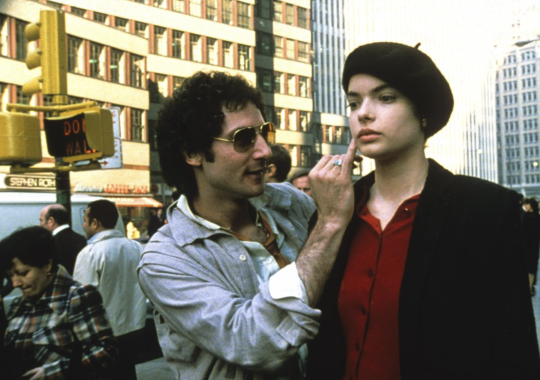
Back when Allen was releasing Manhattan, still riding high off his Best Picture win for Annie Hall, Ferrara was in the exploitation-movie trenches with The Driller Killer, a horror movie that Variety found so risible that its critic wrote “Abel Ferrara makes Tobe Hooper look like Federico Fellini.” (Ferrara and his team were thrilled by the notice.) Though Ms. 45 was a huge leap forward in ambition and sophistication, it wasn’t so far removed from the grindhouse aesthetic of The Driller Killer, with an all-the-animals-come-out-at-night vibe that outsleazed the likes of Taxi Driver and Death Wish. 40 years later, Ms. 45 still feels like a powder keg of a movie, notable for how much it subverts the rape/revenge story without trying to transcend it. It’s full of fascinating contradictions, tied to a character whose mission of vengeance is righteous and cathartic in some respects, and messy and disproportionate in others.
Ferrara wastes not a second of his 80-minute running time in establishing New York as a hostile place for an attractive young woman like Thana (Zoë Lund, then credited as Zoë Tamerlis), who walks through a gauntlet of harassment to her job as a seamstress in the Garment District. She doesn’t have the voice to put these men in their place, and she certainly doesn’t have the voice to scream when a mugger snatches her off the sidewalk and rapes her in a back alleyway. Her powerlessness is cruelly reinforced when she gets back to her apartment and a burglar seizes the opportunity to assault her a second time. Getting raped twice in the same day may sound like a wild coincidence, but through Ferrara’s lens, it seems more like a silent conspiracy, like a pack of wolves circling a wounded gazelle. Thana gets the upper hand by clocking her second attacker in the head with a blunt object—specifically a red apple made of glass, the Catholic Ferrara’s nod to Eve in the Garden—and Thana suddenly emerges as an avenging angel.
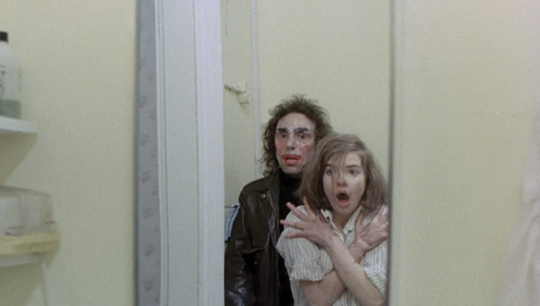
Were Ms. 45 as simple as Thana taking revenge on behalf of herself and other victims of harassment and assault in New York City, it wouldn’t be nearly as provocative and compellingly ambiguous. Once she gets her hands on a gun and starts playing the role of vigilante, there’s something undeniably thrilling about her wandering into the night and blowing would-be rapists away, like Batman in heels and ruby-red lipstick. But there’s an extent to which she’s simply broken psychologically, with an increasing inability to distinguish between deserving targets of her violence and other men who may not have it coming. She’s been made numb to humanity, which explains why she’s able to carve her second attacker into pieces and distribute parts of him in garbage bins and bus-station lockers around the city.
The Taxi Driver connection is critical, underlined in a late scene where Thana, packing her pistol in the stockings of sexy-nun Halloween costume, does her own version of the famed mirror scene in Martin Scorsese’s film. She’s much more sympathetic than Travis Bickle, whose madness is rooted in his own isolation and simmering resentment, but there comes a point toward the finale where she has a Bickle-like need to kill, regardless of the worthiness of her target. There’s an important irony in Scorsese’s film that society rewards him for killing a pimp instead of a politician, even though it makes no difference to him. Thana simply wants to kill men, and the climax at the Halloween party is where it ceases to make a difference to her, either.
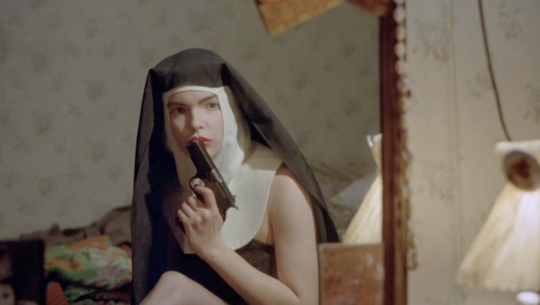
And yet, Ms. 45 doesn’t minimize the sympathy we feel for Thana or the trauma that has been visited upon her, even as events inevitably spin out of her control. Her muteness is a brilliant ploy on the film’s part. When a sleazy photographer makes a move on a co-workers over lunch, she’s not able to tell him off like her friend. She can only “speak” through violence later. But Thana’s muteness isn’t just about letting her gun do the talking. It’s also about the incuriosity of men who have no interest in anything a woman has to say. There’s an entire scene at a bar where Thana listens to a drunk suitor ramble on and on, with no indication that he’s aware of her condition. She’s simply a sounding board for him now, and a hoped-for sex object later.
New York is just as much a “character” in Ms. 45 as it is in Manhattan, brought to life by the grimy texture of Ferrara’s location work and his rigorous efforts to see the world through Thana’s eyes. The city is a snarling monster even before two of its denizens attack her, and it then becomes impossible for Thana to see men as anything other than a threat, whether it’s a relatively innocuous skirt-chaser or the lecherous boss who’s looking to leverage her lapses at work to his advantage. There’s no quarter for a woman like Thana in this New York, neither in the streets where men leer at her nor in a workspace where her livelihood is subject to sexual renegotiation. The threat of violence is everywhere—and she’s given herself license to an extremely proactive form of self-defense.
Ms. 45 exists in an uncomfortable space between raw exploitation and high art, which has been more or less Ferrara’s territory ever since. It recognizes that there’s no tidy way for Thana to express herself, and so the violence she unleashes doesn’t have the satisfying moral clarity of Charles Bronson popping off on the punks who wronged him. Some of the men get what’s coming to them. Others are collateral damage. All Ferrara and Lund seem to ask is for Thana to be understood, to be heard. She’s owed that much at a minimum.
